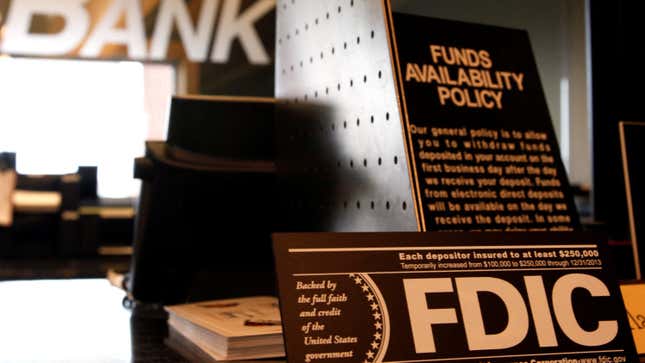
When it comes to deposit insurance rules, the Federal Deposit Insurance Corporation (FDIC) only wants the US Congress to change what it absolutely must. In a new report issued in the wake of Silicon Valley Bank’s failure, the banking regulator posits that it’s only business banking accounts used for payroll that need extra deposit insurance, and not the entire system of deposits.
A reform this narrow means that for other account categories, customers would still need to mind the FDIC insurance limits—currently $250,000 per depositor for each type of account at an insured institution.
“They don’t want to give all deposits insurance because that takes away any incentive to do due diligence on a bank’s health and safety,” said Todd Phillips, a former FDIC lawyer who is now a fellow at the Roosevelt Institute.
Exceptions for deposits at SVB and Signature Bank
Regulators made an exception in March for depositors at Silicon Valley Bank (SVB) and Signature Bank after both institutions fell into receivership. In a rare move meant to stem those failures from rippling into a full-blown banking crisis, the Federal Reserve, FDIC, and Treasury Department promised that customers of both banks would maintain full access to all of the money in their accounts, even if they were above the deposit insurance limit.
For SVB and Signature customers, the emergency guarantee on uninsured deposits was as meaningful as it was unusual; as of Dec. 31, close to 94% of the money on deposit at SVB was uninsured, the largest proportion among any bank with more than $50 billion in assets. Signature wasn’t far behind, with almost 90% of deposits uninsured.
Both banks catered to wealthy clients, who may or may not have been aware that deposits beyond the first $250,000 in each type of account were potentially at risk. But when trouble began at SVB in particular, many of the depositors who ran were business owners and startup founders who weren’t thinking first about the safety of the institution they were banking at. Rather, they were thinking about making payroll for their employees.
The FDIC took note of this, and targeted its request for deposit reforms accordingly.
“What the FDIC is saying is that these are accounts that just need money for payroll—they’re not going to bring market discipline to bear on the banks,” Phillips said. “So they don’t really serve the normal function that we want depositors to perform.”
Any change in deposit insurance limits on these or other types of accounts would require an act of Congress, which means reform could take years or not come at all, but the FDIC’s report at least has “started the conversation,” Phillips said.
Another conversation starter arrived right around the same time as the FDIC’s report—the collapse of First Republic Bank. California-based First Republic saw deposits drain out of its branches in the weeks leading up to its receivership this past weekend, after which the FDIC arranged to transfer substantially all of the bank’s assets and deposits to JPMorgan Chase.